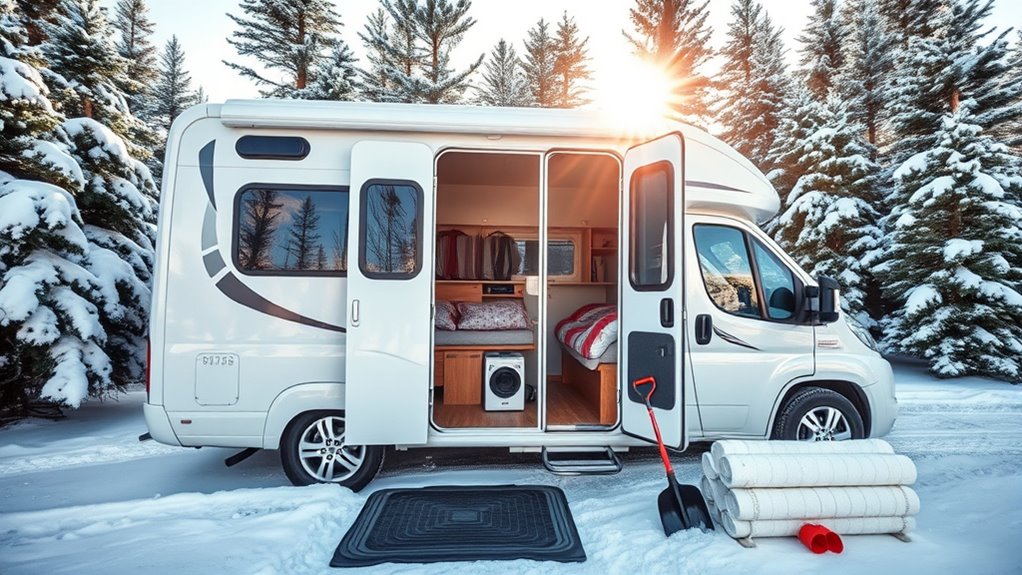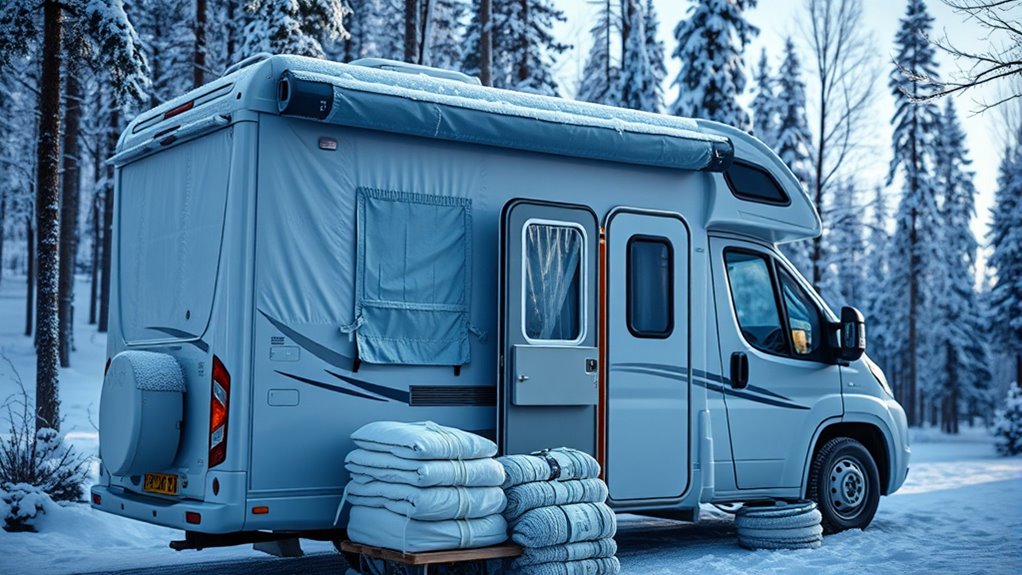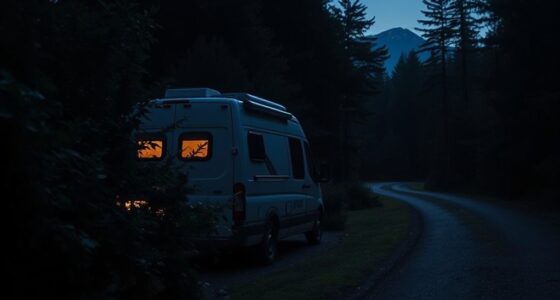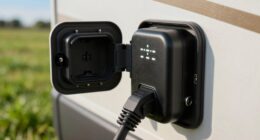To winterize your campervan, you need to thoroughly insulate and seal all gaps around windows, doors, and vents with weatherstripping or foam tape. Drain and antifreeze your plumbing system, ensuring exposed pipes are insulated with foam sleeves or heat tape. Maintain your heating system by servicing it and checking fuel additives for diesel models. Regularly monitor antifreeze levels and manage moisture with dehumidifiers or moisture barriers. Implementing these precise measures helps prevent freeze damage—continue exploring to master winter-proofing your campervan.
Key Takeaways
- Insulate walls, floors, and windows to retain heat and reduce energy consumption during winter trips.
- Drain water systems and add RV-specific antifreeze to prevent freezing of pipes and tanks.
- Seal vents, install covers, and use moisture barriers to prevent drafts and moisture buildup inside the campervan.
- Service the heating system, check fuel lines, and ensure proper operation for reliable warmth in cold conditions.
- Insulate vulnerable areas like pipes and vents, and regularly monitor antifreeze levels and ventilation to prevent winter damage.

As temperatures drop, preparing your campervan for winter is crucial to guarantee damage and secure reliable operation in cold conditions. Proper insulation upgrades are necessary to maintain interior warmth and prevent heat loss, especially during extended periods of low temperatures. Focus on sealing any gaps around windows, doors, and vents with weatherstripping or foam tape. Consider adding reflective insulation or foam board to exterior walls and underneath flooring to reduce thermal transfer. Inspect existing insulation for compression or damage, and reinforce or replace it where needed to improve R-value. Upgrading insulation not only enhances comfort but also reduces the load on your heating system, conserving energy and prolonging its lifespan. Additionally, understanding the contrast ratio of your heating system can help you determine its effectiveness in maintaining consistent temperatures during winter months.
Seal gaps and upgrade insulation to keep your campervan warm and efficient during winter.
Alongside insulation enhancements, antifreeze precautions are essential to protect your campervan’s plumbing system. Drain all water lines and tanks before winter storage if you won’t be using the vehicle for an extended period. If you plan to keep the campervan operational, install non-toxic RV-specific antifreeze in the freshwater system, including the pump, faucets, and any exposed pipes. Ensure that all drain valves are open, and use a specialized antifreeze mixture designed for RV plumbing to prevent freezing and cracking. Regularly check the antifreeze levels and replace it as recommended by the manufacturer, especially if the vehicle endures frequent temperature fluctuations. It’s also advisable to insulate exposed pipes with foam sleeves or heat tape, which provides an additional layer of thermal protection and prevents freezing in vulnerable areas.
In addition to insulation and antifreeze measures, you should evaluate your campervan’s ventilation system. Cold air infiltration can be minimized by sealing vents and installing covers or insulating curtains over windows. Proper ventilation prevents moisture buildup, which can lead to mold and frost issues. Be mindful of potential condensation points—such as around windows and skylights—and consider installing moisture barriers or dehumidifiers to keep the interior dry.
Finally, ensure your heating system is thoroughly serviced and capable of maintaining consistent temperatures. Verify that all thermostats, fans, and fuel lines are in top condition. For diesel-powered campervans, check that fuel filters are clean and consider adding anti-gel additives to prevent fuel from gelling in low temperatures. By integrating comprehensive insulation upgrades with antifreeze precautions and proper system maintenance, you’ll safeguard your campervan against winter damage and guarantee dependable operation throughout the cold season.
Frequently Asked Questions
How Can I Prevent Frozen Pipes in My Campervan?
To prevent frozen pipes, you should insulate all water lines with foam or heat tape, especially in vulnerable areas. Keep your campervan heated, using portable heaters if necessary, and run water periodically to prevent stagnation. Wear winter clothing to stay warm during maintenance, and carry snow chains for traction on icy roads. Drain and winterize your plumbing system if prolonged exposure to freezing temperatures is unavoidable.
What Insulation Methods Are Most Effective for Campervans?
You should focus on high-quality insulation materials like spray foam, rigid foam boards, or Reflectix, which act as thermal barriers. These materials effectively trap heat and prevent cold drafts, maintaining consistent interior temperatures. Install them carefully around walls, floors, and ceilings, sealing gaps with foam or tape. Proper insulation not only keeps you warm but also minimizes energy use, making your campervan winter-ready and comfortable despite the freezing environment outside.
How Do I Maintain Battery Performance in Cold Weather?
To sustain battery performance in cold weather, you should regularly check and keep your batteries fully charged, as cold reduces their capacity. Use a battery maintainer or trickle charger to prevent voltage drops during storage. Insulate batteries with foam or thermal blankets to minimize cold exposure. Additionally, avoid deep discharges, and ensure your campervan is parked in a heated or insulated space when possible, which helps optimize battery efficiency in low temperatures.
What Safety Precautions Should I Take During Winter Camping?
Think of yourself as a winter explorer steering through a frozen wilderness. To stay safe, always maintain fire safety by keeping a fire extinguisher nearby and avoiding open flames near combustible materials. Wildlife awareness is vital; store food securely and avoid attracting animals. Dress in layered, insulated clothing, and keep emergency supplies accessible. Regularly check weather forecasts and inform someone of your plans. These precautions help guarantee your safety during winter camping adventures.
How Can I Keep My Campervan’s Water System From Freezing?
To prevent your campervan’s water system from freezing, you should use a suitable antifreeze, like non-toxic RV antifreeze, in your freshwater lines. Regularly inspect and maintain your heater to ensure proper circulation and heat output. Insulate exposed pipes with foam or heat tape, and keep the interior temperature above freezing. Running the heater periodically and draining certain systems overnight also help avoid freezing and damage.
Conclusion
By carefully winterizing your campervan, you create a resilient shell that gracefully withstands the silent, icy embrace of cold weather. Properly drained systems and insulated components act as silent guardians, preventing frost from taking hold. With diligent attention to these details, your campervan transforms into a steadfast vessel, ready to voyage through winter’s quiet, snowy landscape. This preparation ensures comfort and functionality, turning potential challenges into a smooth, worry-free journey amid the season’s gentle, frosty kiss.










